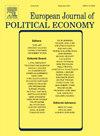Central bank independence and fiscal rule under populist leader's regime
IF 2.4
3区 经济学
Q2 ECONOMICS
引用次数: 0
Abstract
This study examines the relationship between fiscal rules, populist leadership, and central bank independence. It posits that populist leaders, driven by the desire to stimulate economic activity and gain public approval through short-term expansionary policies, are more inclined to undermine central bank independence when they are constrained by fiscal rules. The findings reveal that fiscal constraints significantly increase the likelihood of weakened central bank independence under populist leadership, a result that remains robust across various model specifications. These effects are particularly pronounced in political contexts where populist leaders exert greater authority and encounter stronger incentives to prioritize monetary policy over fiscal measures. Moreover, the adverse impact on central bank independence is exacerbated when fiscal rules impose stricter constraints on short-term expenditures, with reduced independence primarily reflected in shifts in central bank policies. These results highlight the importance of political dynamics in fiscal and monetary institutions and emphasize the need for complementary measures to stabilize macroeconomic conditions through coordinated fiscal rules and central bank independence.
民粹主义领导人政权下的央行独立性和财政统治
本研究考察了财政规则、民粹主义领导和央行独立性之间的关系。它认为,受刺激经济活动、通过短期扩张性政策获得公众认可的愿望驱动的民粹主义领导人,在受到财政规则约束时,更倾向于破坏央行的独立性。研究结果显示,财政约束显著增加了民粹主义领导下央行独立性被削弱的可能性,这一结果在各种模型规格中都保持强劲。这些影响在民粹主义领导人拥有更大权威的政治背景下尤其明显,因为他们有更强的动机将货币政策置于财政措施之上。此外,当财政规则对短期支出施加更严格的限制时,对央行独立性的不利影响就会加剧,独立性的降低主要反映在央行政策的变化上。这些结果突出了财政和货币机构中政治动态的重要性,并强调需要采取补充措施,通过协调财政规则和中央银行独立性来稳定宏观经济状况。
本文章由计算机程序翻译,如有差异,请以英文原文为准。
求助全文
约1分钟内获得全文
求助全文
来源期刊

European Journal of Political Economy
Multiple-
CiteScore
3.40
自引率
10.00%
发文量
106
期刊介绍:
The aim of the European Journal of Political Economy is to disseminate original theoretical and empirical research on economic phenomena within a scope that encompasses collective decision making, political behavior, and the role of institutions. Contributions are invited from the international community of researchers. Manuscripts must be published in English. Starting 2008, the European Journal of Political Economy is indexed in the Social Sciences Citation Index published by Thomson Scientific (formerly ISI).
 求助内容:
求助内容: 应助结果提醒方式:
应助结果提醒方式:


